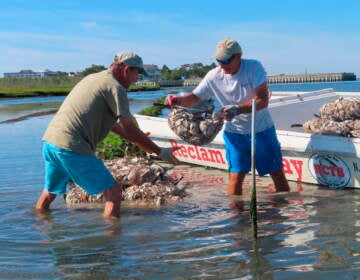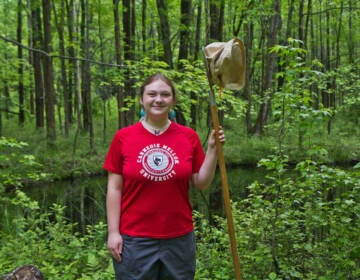Floatopia promotes a swimmable (and tube-worthy) urban Delaware River
Upstream Alliance, an environmental group, organized last weekend’s event to show that the stretch between Philly and Camden is safe to float in — sometimes.

Erica Baugh of Upstream Alliance floats on the Delaware River in Pyne Poynt Park in Camden, N.J. (Miguel Martinez for WHYY)
While lounging in an inner tube in the middle of the Delaware River’s back channel in North Camden, Nathan Boon was amazed by the different view of the Philadelphia skyline — just the tips of the tallest buildings peeking out through the end-of-summer green leaves.
“It’s kind of awesome that we have the same view from the roof deck of our house, we can see the same buildings,” said Boon, who lives in South Philly. “There’s Billy Penn on top of City Hall and we see that from our house, but here we are, not lounging on our roof deck, but lounging on the Delaware River in our floaties.”
After taking off from a small cove at Pyne Poynt Park in Camden, Boon and about a dozen other people waded into the river to float on blow-up pink flamingos, ducks, even a waterproof riding bull.
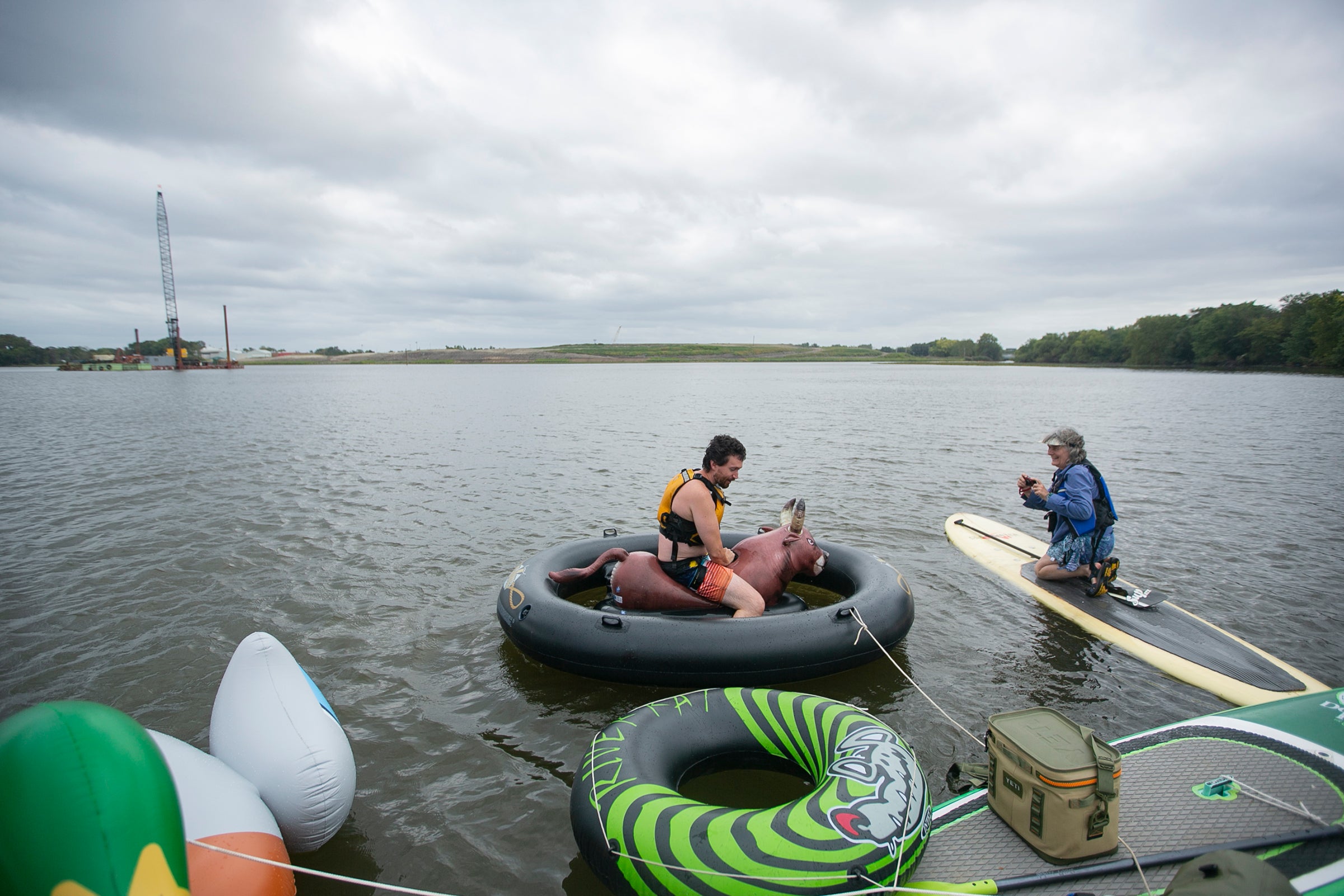
Despite its popularity along the Delaware in the northern suburbs in Pennsylvania and New Jersey, tubing on the section of the river that passes Philadelphia itself is not a widely accepted practice.
That’s why Don Baugh, president of the environmental nonprofit Upstream Alliance, organized last Saturday’s “Floatopia.”
Besides being a fun way to spend a weekend afternoon, Baugh hoped the event could help promote the urban section of the Delaware River as a safe place to float — sometimes.
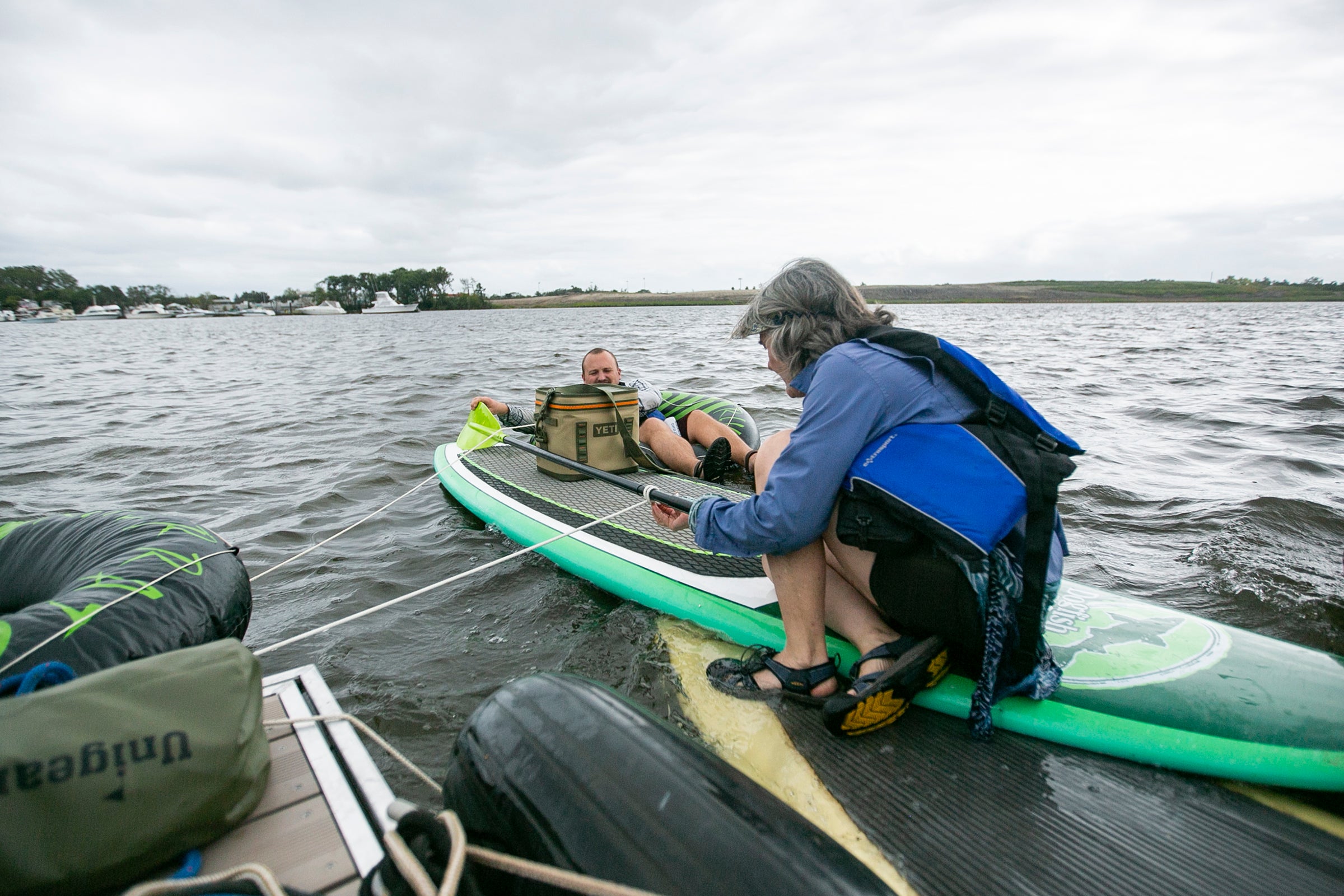
Reconnecting with the river
The Delaware is one of the country’s best examples of a waterway that’s been revived because of the 1972 Clean Water Act, said Baugh. It’s a 301-mile-long river that, in most places, is safe to swim and play in.
But not in the Philadelphia-Camden section: Between the Tacony-Palmyra and Commodore Barry bridges, the Delaware River Basin Commission has deemed the water unsafe for human contact. Debris that washes into the river, bacteria from fecal matter, large commercial ships, and currents make swimming, wading, and floating risky in this stretch of the Delaware.
Baugh, whose group works on clean water, public access and climate resilience issues, said the prohibition on swimming and wading may not always be necessary.

During periods of heavy rain, sewage treatment plants in Philadelphia and Camden become overwhelmed, sending raw sewage into rivers and streams. But a day or two afterward, he said, water-quality levels start to return to normal. Baugh said that the Upstream Alliance has collected some data to support this, but that more research still needs to be done.
Kate Schmidt, a spokeswoman for the Delaware River Basin Commission, the multistate agency that regulates the watershed, said it cannot confirm whether this urban zone of the Delaware is safe for recreation during all weather conditions.
This summer, the DRBC enhanced its bacterial-monitoring program in this stretch of the river, to collect more data on whether conditions warrant a change in its recreation designation to allow for tubing and wading in the water.
The results are not available yet, but Schmidt said one reason the agency launched the program is because it has noticed more recreation on the river in Philly and Camden.
“The fact that people want to be reconnected to the river and experience it first-hand is a sign of the overall improvement in water quality in the river over the past 50-plus years,” Schmidt said.
For its part, the Philadelphia Department of Parks and Recreation prohibits swimming and wading in the Delaware River; its website does not specifically mention tubing, though recreational boating is allowed on the river with the proper permit.
For that reason, Upstream Alliance held its tubing event on the other side of the river. Maggie McCann Johns, Camden County’s parks director, observed the kickoff to the weekend’s Floatopia.
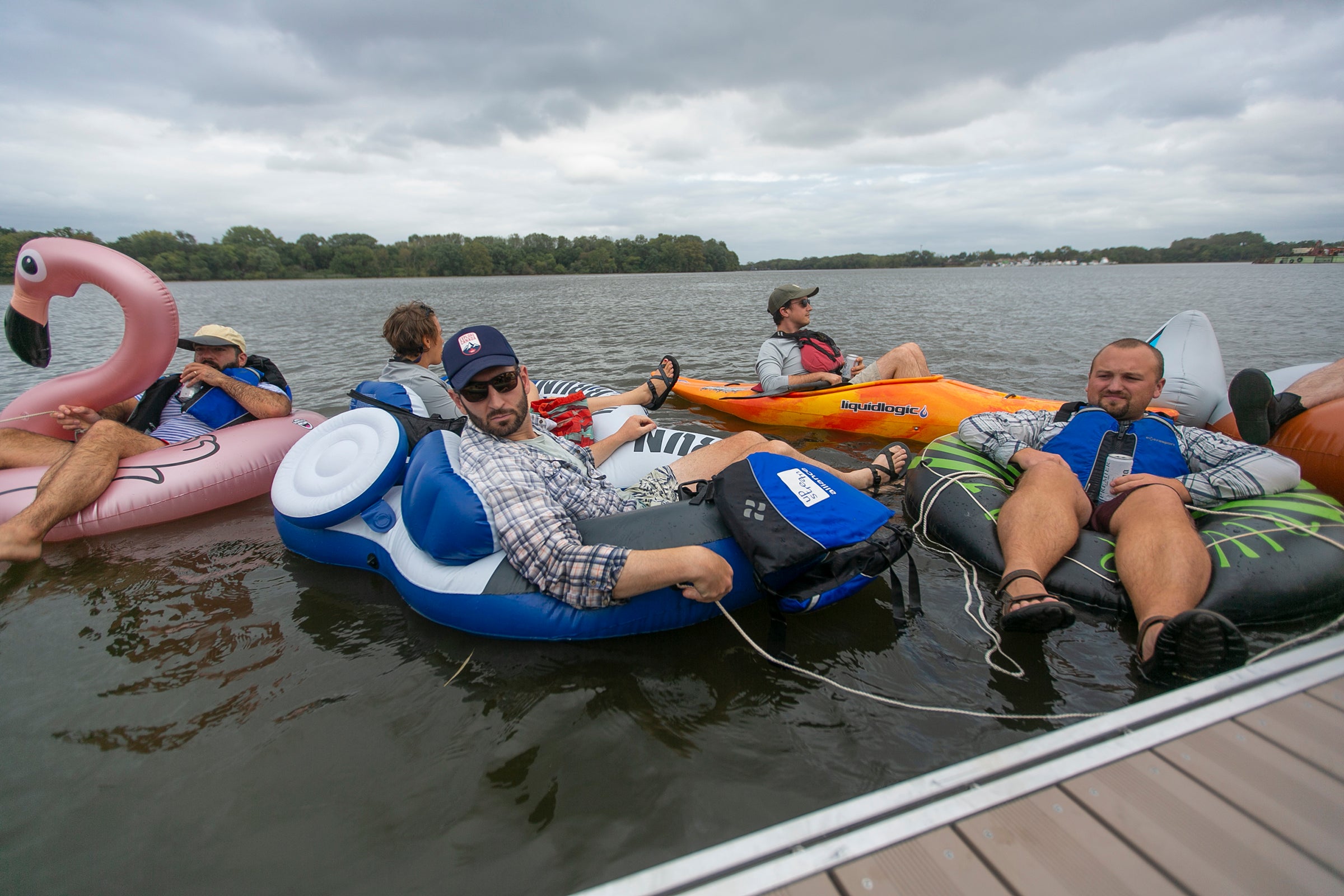
Jenny Kraft, who participated in the event, said she often tubes farther north along the river. The South Philly resident said she doesn’t worry about the water quality near the city.
“I’m never worried about my health after getting in the river,” Kraft said. “There are so many other risks we take every day just living in the city, that getting in this water does not feel like one of them.”
As for the other safety concerns, like large ships, Baugh said Upstream Alliance has started a conversation between recreational boaters, paddlers, and commercial vessels to find ways for them to peacefully coexist.
“Just the other day, I had a dialogue with the heads of the ports, and he said, ‘It’s pretty simple, stay away from the big ships,’” Baugh said.

Floating for change
Saturday’s float was a pilot effort for a bigger one — think hundreds of people — that he hopes to organize in Camden next summer, Baugh said.
For Saturday’s smaller party, he set up a floating dock for tubers to tie ropes to, so they wouldn’t drift unintentionally out of the back channel and into the shipping channel.
Baugh started working in the Philadelphia-Camden region a few years ago, to help form the Alliance for Watershed Education of the Delaware River. He was shocked and dismayed that people didn’t often view the Delaware in a positive light.
“I mean here’s this wonderful, vibrant river that was the reason why these cities are here,” Baugh said. “But we’ve turned our backs on this river.”
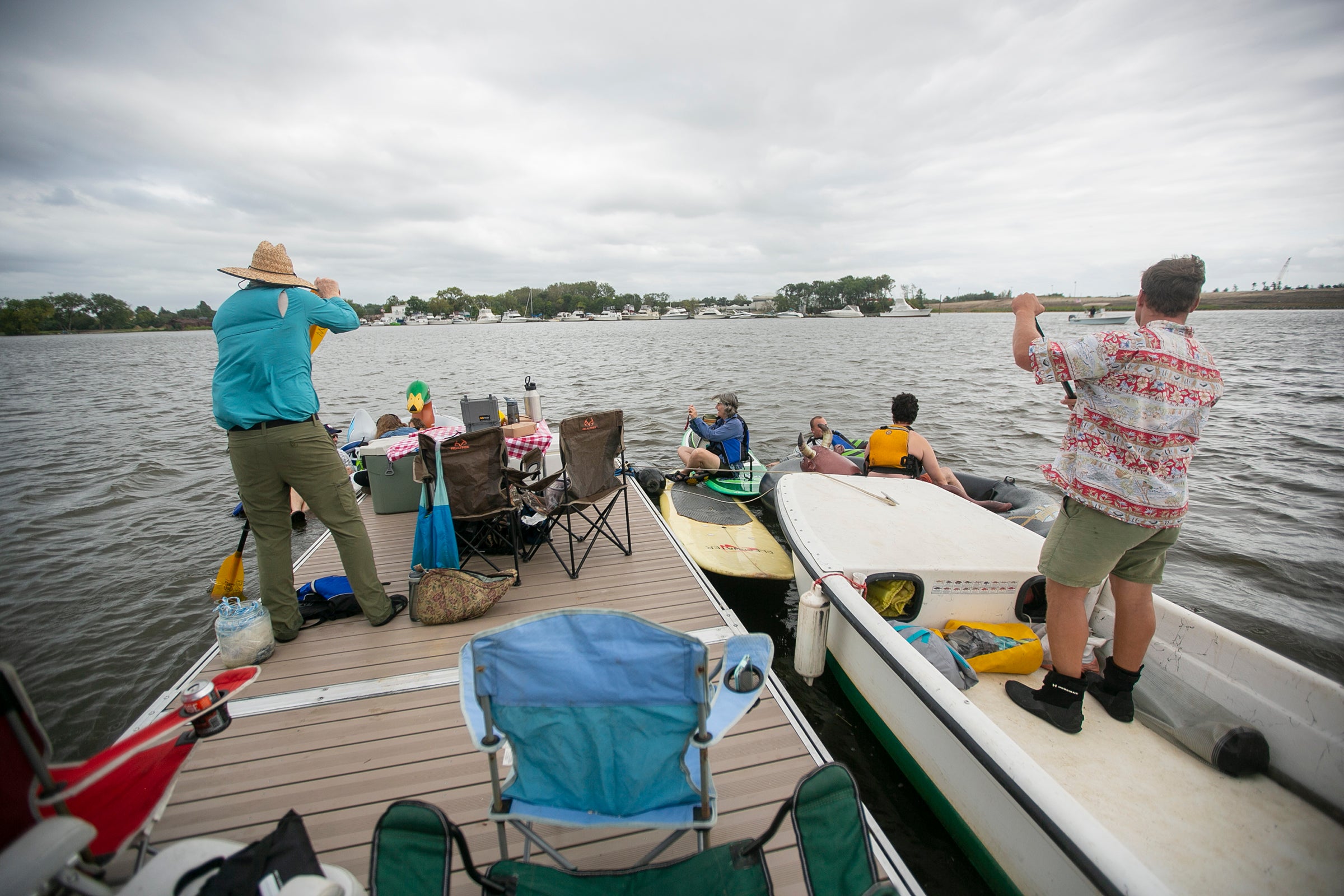
He thinks Floatopia — named for similar events that started out of Santa Barbara, California — can be a jumping-off point for more conversations on how to keep the river clean and safe enough to swim, wade, and float in.
While drifting along this quieter section of the river, the floaters passed many symbols of Camden’s past and present: an abandoned marina with dozens of shipwrecked boats, a former landfill that’s being turned into a waterfront park. Even Pyne Poynt Park, the tube crew’s starting point, was a public swimming beach in the early 20th century, decades before the Clean Water Act.

“Wouldn’t it be great in the city of Camden to have an urban beach for the communities to enjoy?” Baugh said.
Come summer 2020, Baugh hopes to have more data to show that the water quality is good enough for Floatopia 2.0. But more importantly, he hopes the water party can help sway public opinion around the river.
“The Floatopia is a way of making the point that we can do this,” he said, “that the water can be something we cherish, that we can love, that we can embrace, that we can swim and dive off a platform to, that this is something we want to be able to do 365 days a year.”
WHYY is your source for fact-based, in-depth journalism and information. As a nonprofit organization, we rely on financial support from readers like you. Please give today.



